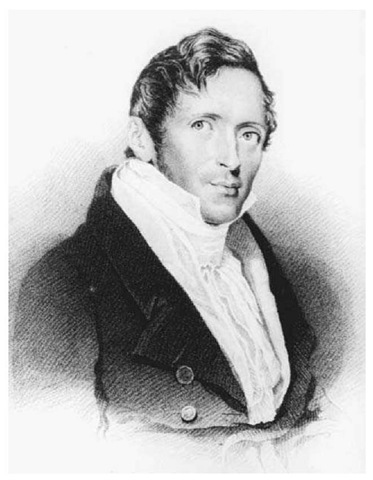1781-1826
Born July 6, 1781, Sir Thomas Stamford Raffles is best k administration of Java, founded Singapore, devoted himself to ethnography and natural history, and published a seminal History of Java. nown for his career in the East India Company, during which he played a central role in the British conquest and
Sir Thomas Stamford Raffles. The industrious British colonial administrator and founder of Singapore, in a portrait engraving rendered in 1810.
Raffles’s first ten years with the East India Company were spent as a clerk in the company’s London offices. In 1805 he secured an overseas appointment as assistant secretary to the Governor of Penang in 1805. Thereafter his avowed goals were the extension of British power over the key trade routes between India and China and the ”improvement” of the territories he administered. His first action of note was to assist in planning an expedition led by Lord Minto, Governor General of India, which conquered the Dutch possession of Java in 1811. As a reward for his efforts, Minto appointed Raffles Lieutenant-Governor of the island and its dependencies. Raffles consolidated the conquest by deposing or intimidating Javanese rulers reluctant to recognize British supremacy. He also demonstrated his penchant for expansion by moving against Palembang in southeastern Sumatra (1812). Raffles deposed the sultan, set aside his only son and heir, and installed the sultan’s more malleable brother as a British client.
In domestic terms Raffles’s administration of Java (1811-1815) focused on the related goals of economic liberalization and ”moral improvement.” Between 1812 and 1815, he ended the Dutch system of forced commodity production at set prices and introduced a land tenure system similar to that found in the Ryotwari settlement, in which fixed land-rents were paid directly to the government by small tenants rather than intermediaries. Through such reforms, Raffles hoped to stimulate the economy, increase government revenues, and improve the prospects of the agricultural classes. He also forbade the sale of contracts for cockfighting and gaming (1811), took steps to restrict the trade in opium, and abolished the slave trade (1813). However, economic imperatives and resistance from the Company sometimes inhibited his efforts toward ”moral” reform, as in the case of the opium trade.
Raffles’s vision of Java as a permanent possession from which British influence would spread suffered a fatal setback in 1815, when it was returned to the Dutch as part of the Vienna settlement. In that same year, Raffles was dismissed and recalled to London by his superiors, who had become angered by his failure to make Java profitable, by allegations of financial impropriety on his part, and by his unapologetic expansionism. A vigorous defense of his administration, supported by his History of Java (1817), cleared him of all charges of wrongdoing and secured Raffles a knighthood and the Lieutenant-Governorship of Benkulu on Sumatra. Nevertheless, his appointment to such a backwater is a measure of the continuing official suspicion toward his policies.
At Benkulu (1817-1824), Raffles pursued his familiar policies of improvement and expansion. He sought to prevent the return of Dutch influence to Palembang and also advocated the extension of British control over the Straits of Malacca in 1818. Fearing a Dutch resurgence, Minto’s replacement, Lord Hastings, approved Raffles’s plan for the straits. Raffles then exploited a succession crisis in Johore to install (March 1819) a Sultan favorable to a British settlement at Singapore. Though put in an awkward position by this forward move into a region claimed by the Dutch, the British Government saw Singapore’s strategic and commercial potential and recognized Raffles’s acquisition. Raffles exercised direct supervision over Singapore only intermittently between 1819 and 1824, for less than a year all told, yet he remained the single most important influence over its early development: he designed the town plan, promulgated a constitution and code oflaws, eradicated gaming, cock-fighting, and slavery, and founded a college.
His many professional responsibilities notwithstanding, Raffles was a devoted student of philology, ethnography, and natural history throughout his career. His History of Java made important contributions to scholarship in all these areas and long remained a foundation of colonial understandings of Java. Raffles also acted as patron and partner for others with similar interests, such as the American naturalist Dr. Thomas Horsfield, and was likewise instrumental in resuscitating the Batavian Society of Arts and Sciences in 1812. An avid collector of artifacts, texts, and specimens, Raffles amassed an extensive collection, most of which was destroyed while en route to Britain in 1824. The remainder still constituted a significant addition to the body of scientific knowledge so important to quantifying, classifying, and possessing colonial holdings in Southeast Asia in later years. After his retirement to England, Raffles’s interest in natural history occupied much of his time, and culminated in his foundation of the Zoological Society in London months before his death on July 5, 1826.

